The One Where I Looked at the Big Picture
On Confronting Reality
In this line of work, it’s easy to become desensitized to the information we work with on a daily basis. Everyday, I sort through our clients, who have been wrongfully accused of stealing or awaiting a trial for years in a tiny cell. As a lawyer, it’s easy to read their stories and not really think through what they must be feeling: the fear, anger, sadness, and loneliness.
Within the past few weeks, a couple of things have happened in my personal life here that have forced me to confront the law in reality. I won’t go into details, but it really made me connect with the work I’ve been doing all summer. As I sit in the office, researching and organizing the hundreds of client names for RBJ, I’m no longer going to blindly browse and read the cases. A lawyer’s work makes a real difference in the lives of their clients, and we should be aware of just how much of an impact we have. That means we have to learn the contextual consequences of the case in their personal life and how our assistance might impact that. It’s easy to get into a rhythm of helping or providing advice to people, but it’s much harder to really understand their situation. Unless you’re confronted with their reality, you never truly know what they are dealing with.
On Reporting and Researching
This week at work, I was pulled in a couple of different directions. My first task was to finish up the OSIEA proposal for funding and complete a budget form for the application. I’ve never done a budget proposal before, so it was a great experience (despite having to work with numbers and math, gross). Completing a budget form is a pretty typical task when applying for grants as a non-profit, and you have to tailor what you include in your proposal to the organization you’re applying to. I combined a couple of previous budget forms for different proposals to create a unique one for OSIEA. Since RBJ is looking to get money mainly for their rights-awareness campaigns they are hoping to host in the fall, I had to include figures from previous campaigns, future variable that may affect these numbers, and figures based on how many staff members we need to pay. I’m proud of myself for completing this task in a relatively short amount of time, even though I don’t have any previous finance or math skills to rely on!
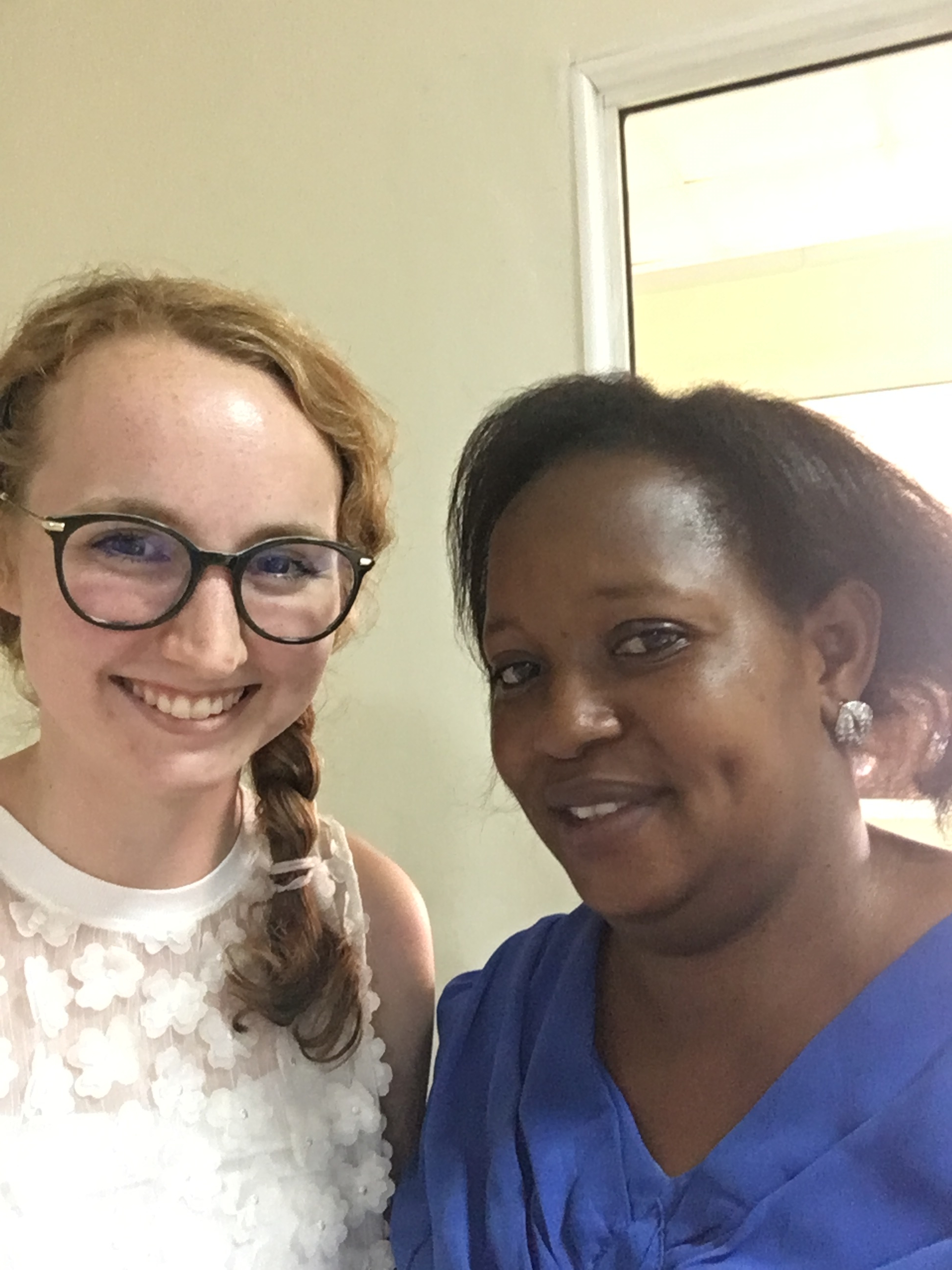 On top of this report, I worked on two new countries for IBJ’s Wiki pages: Zimbabwe and Senegal. When I got the Wiki page for Zimbabwe, it was pretty bare bones. It had some essential information, but I knew that I needed to add a lot more if this was going to be a reputable reference page for lawyers. Luckily, all of Zimbabwe’s legal information is in English, so finding sources was relatively easy. The legal system is a common law system, like the US, with eight types of courts established by the Constitution. The Constitution includes many fundamental rights and freedoms, including the right to personal liberty, right to a fair hearing, and freedom from torture and cruel and unusual punishment.The trial and pre-trial system is very similar to the US as well, and trials are investigatory in nature, meaning the defense and prosecutor investigates the case and brings it to the judge for a decision. The Legal Aid Directorate provides pro-bono legal representation to indigent persons, but only in serious civil cases. The national prison population is 19,382, which means the official occupancy level of the prisons is at 114 percent, which has been improvement in recent years.
On top of this report, I worked on two new countries for IBJ’s Wiki pages: Zimbabwe and Senegal. When I got the Wiki page for Zimbabwe, it was pretty bare bones. It had some essential information, but I knew that I needed to add a lot more if this was going to be a reputable reference page for lawyers. Luckily, all of Zimbabwe’s legal information is in English, so finding sources was relatively easy. The legal system is a common law system, like the US, with eight types of courts established by the Constitution. The Constitution includes many fundamental rights and freedoms, including the right to personal liberty, right to a fair hearing, and freedom from torture and cruel and unusual punishment.The trial and pre-trial system is very similar to the US as well, and trials are investigatory in nature, meaning the defense and prosecutor investigates the case and brings it to the judge for a decision. The Legal Aid Directorate provides pro-bono legal representation to indigent persons, but only in serious civil cases. The national prison population is 19,382, which means the official occupancy level of the prisons is at 114 percent, which has been improvement in recent years.
Updating the Senegal page was a very different experience from Zimbabwe. The official language of Senegal is French, so all of their legislation is in French. This meant I had to translate the French legislation into English or find official English copies of some legislation. This made the editing process take quite a bit longer. Senegal gained their independence from France in 1960. They previously tried to form unions with Sudan (1959) and The Gambia (1989), but these didn’t last. The country is overwhelmingly Muslim (96 percent), and 60 percent of the population is under 25 years old. Recently, the president has held constitutional referendums and parliamentary votes to change the presidential term limits and abolish the prime minister position. The legal system is based on the French civil code, but Islamic and traditional laws have great influence on the judicial system today. Pre-trial detention is a significant problem, with 45 percent of the prison population being pre-trial detainees and the average length of pre-trial detention being two years. This contributes to a high national prison population that has been growing in recent years.
I ended the week by sitting in on a meeting with Dignity in Detention Foundation (DiDé). DiDé works to improve the mental health facilities of prisons and provide rehabilitative support post-conviction. RBJ has teamed up with DiDé to train prisoners and prison staff on how to improve their mental health resources and increase knowledge about prisoners’ rights. The main project RBJ and DiDé are working on now is training prisoners and staff on how to conduct group therapy sessions in the prison. These sessions allow for an increase in mental health resources and awareness while not overloading prison psychologists with individual cases. DiDé and RBJ are also hosting a radio rights awareness campaign funded by the EU to teach people about their foundational legal rights. The campaign will gather together legal experts and government officials to talk about basic rights for accused and detained people.
On Canopy Walking
This weekend, my roommates and I decided to take a last minute trip to Nyungwe National Park. Straddling the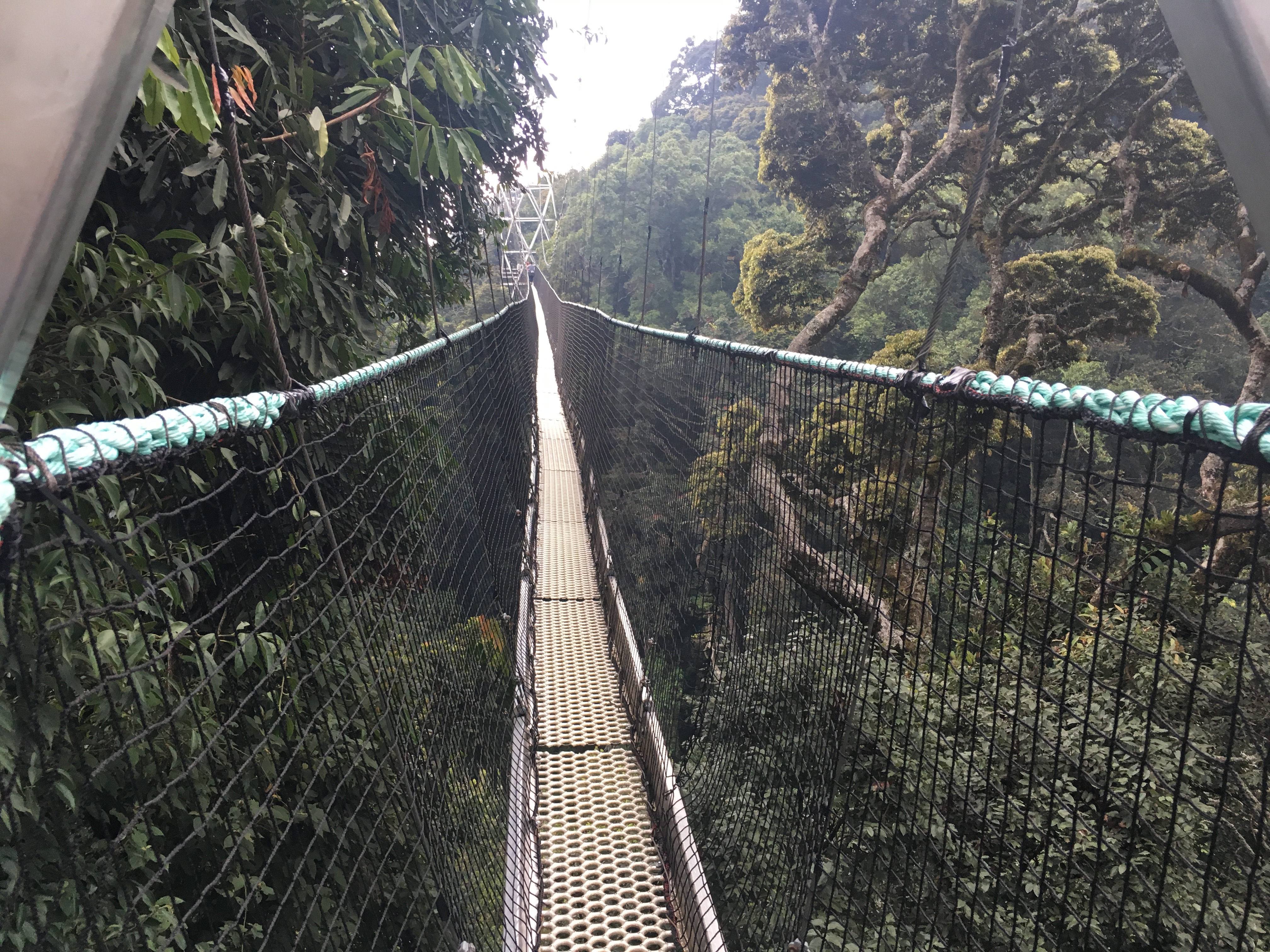 border between Burundi and Rwanda, Nyungwe is one of the oldest rainforests in Africa. We started our journey from
border between Burundi and Rwanda, Nyungwe is one of the oldest rainforests in Africa. We started our journey from 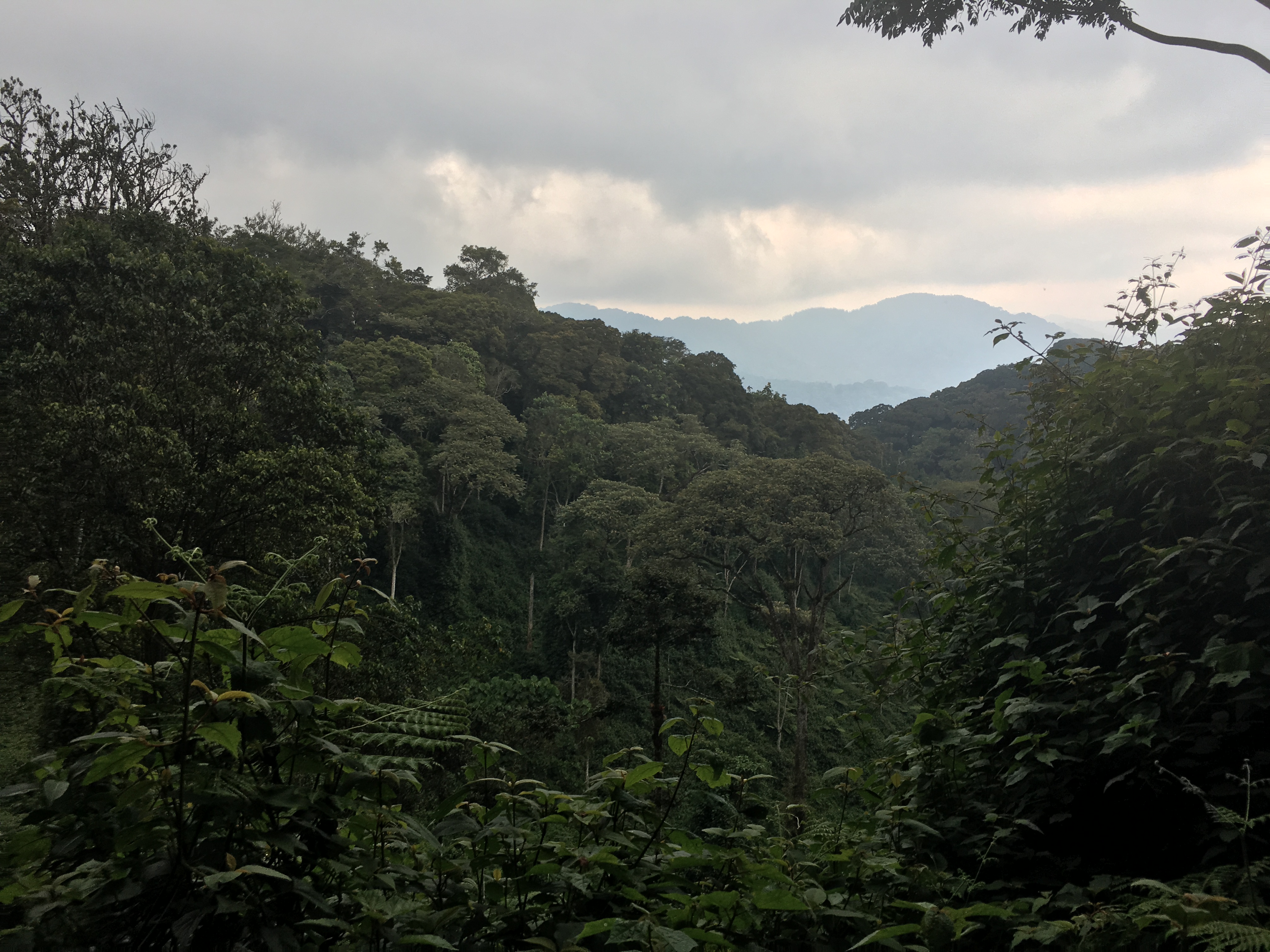 Kigali at 5 am, since the park is about 4 hours away by car. Once we got into the park, we had an hour until reaching our desired hiking trail on a twisty road filled with camouflaged Rwandan military personnel and monkeys.
Kigali at 5 am, since the park is about 4 hours away by car. Once we got into the park, we had an hour until reaching our desired hiking trail on a twisty road filled with camouflaged Rwandan military personnel and monkeys.
After the stomach-upsetting drive, we reached our destination: the Canopy Walk. The Canopy Walk is a terrifying excursion of 160 m (525 ft) across a suspension bridge high above the rainforest. The bridge is about 70 m (230 ft) off the ground, placing you just above the tips of the trees and in full view of the breathtaking mountains.
We started our journey by hiking half a mile down to the beginning of the bridge. Armed with our wooden 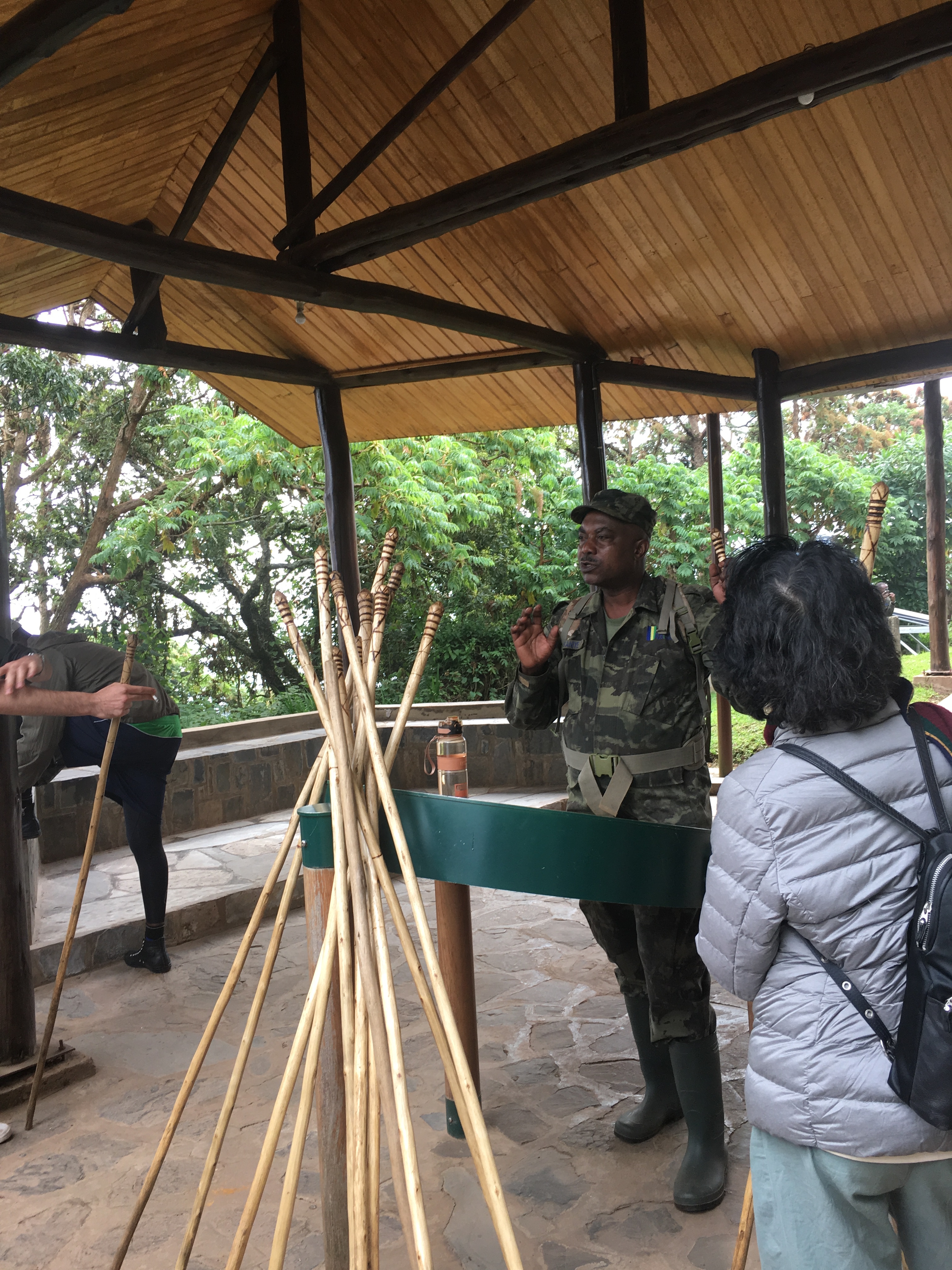 hiking sticks, we dutifully followed our guide into the rainforest. Along the way, he pointed out various types of plants, monkeys and birds. When we finally reached the bridge, my fear of heights was really kicking in. The bridge consists of three parts to get to the other side. It’s lined with netting that came up to my shoulders, but being a suspension bridge, it’s still subject to swaying in the wind. Luckily, we didn’t go on a very windy day.
hiking sticks, we dutifully followed our guide into the rainforest. Along the way, he pointed out various types of plants, monkeys and birds. When we finally reached the bridge, my fear of heights was really kicking in. The bridge consists of three parts to get to the other side. It’s lined with netting that came up to my shoulders, but being a suspension bridge, it’s still subject to swaying in the wind. Luckily, we didn’t go on a very windy day.
We leaned our hiking sticks up against a tree and stepped on the bridge. To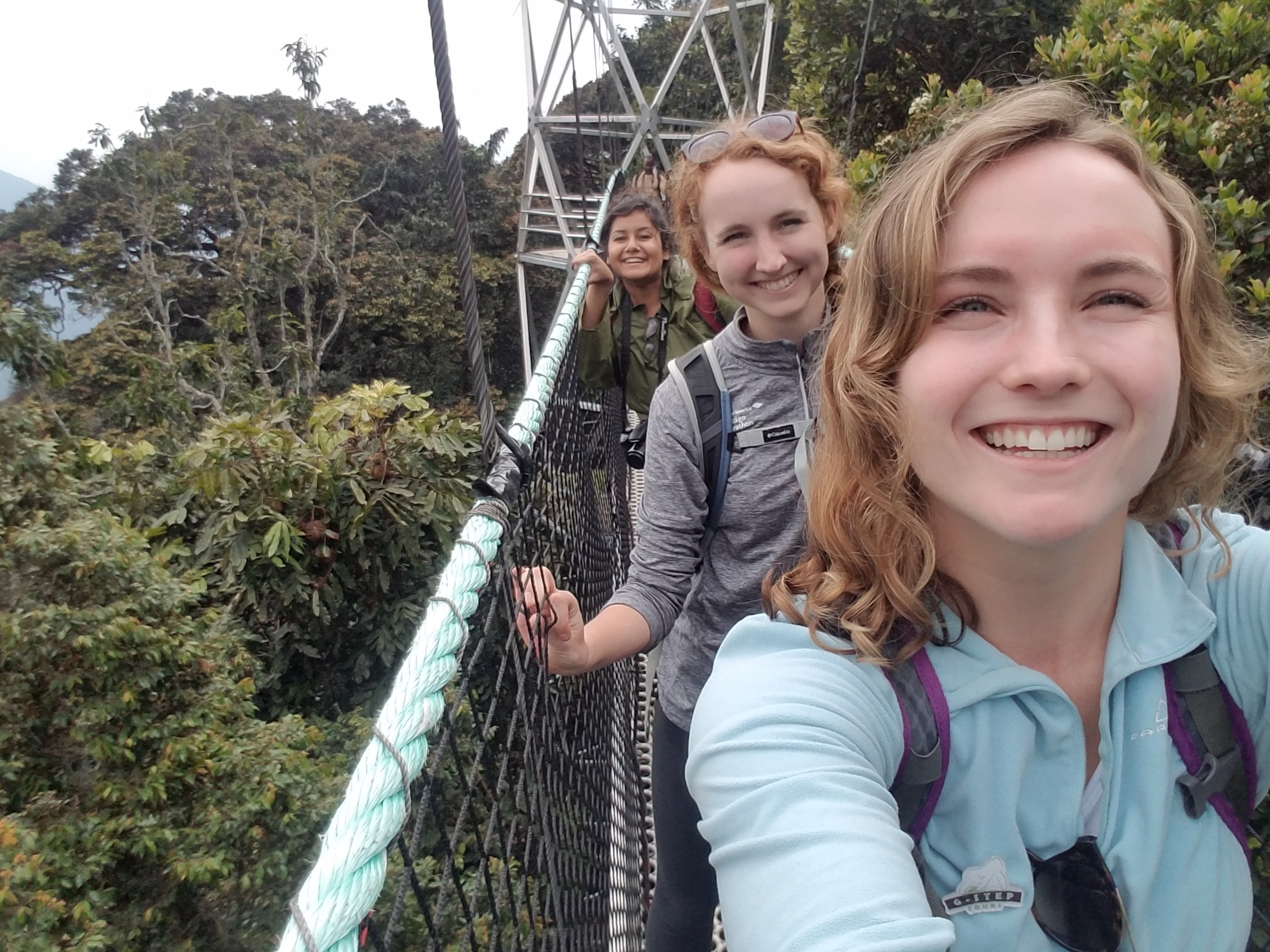 my surprise, I felt relatively safe; that is, if I kept moving and didn’t look over the edge. 525 ft doesn’t seem like a very long distance, but it took us a good 30 minutes to get there and back. By the end, I was pushing my friends, who stopped to take pictures while precariously placing their phones and cameras over the edge, along to finish up. I never thought I was going to fall off, but it felt unnerving to be up that high!
my surprise, I felt relatively safe; that is, if I kept moving and didn’t look over the edge. 525 ft doesn’t seem like a very long distance, but it took us a good 30 minutes to get there and back. By the end, I was pushing my friends, who stopped to take pictures while precariously placing their phones and cameras over the edge, along to finish up. I never thought I was going to fall off, but it felt unnerving to be up that high!
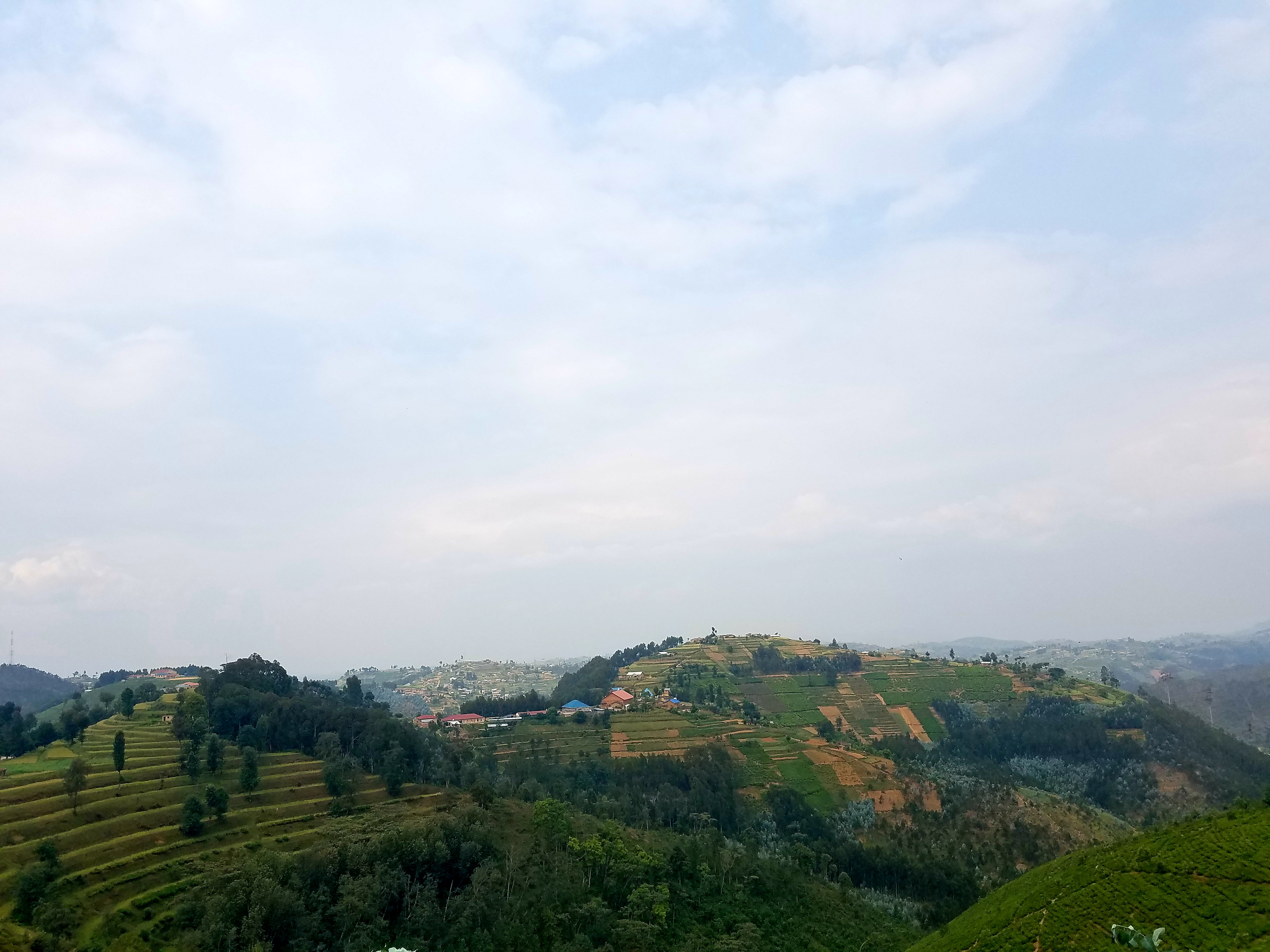 After everyone in our group successfully made it across the bridge, we grabbed our sticks and started on our trek up to high ground. For lunch, our car stopped at a little hotel overlooking the gorgeous tea fields lining the Rwandan hillside. Tea is one of the largest exports in Rwanda after being introduced in 1952. The fertile soil and high altitudes near Nyungwe make a perfect combination for growing tea. Usually, a farmer will own a tea field on one hill and will pick the thousands upon thousands of tea leaves by hand. Looking over the tea fields on a hillside, finally on stable ground, I felt much more comfortable!
After everyone in our group successfully made it across the bridge, we grabbed our sticks and started on our trek up to high ground. For lunch, our car stopped at a little hotel overlooking the gorgeous tea fields lining the Rwandan hillside. Tea is one of the largest exports in Rwanda after being introduced in 1952. The fertile soil and high altitudes near Nyungwe make a perfect combination for growing tea. Usually, a farmer will own a tea field on one hill and will pick the thousands upon thousands of tea leaves by hand. Looking over the tea fields on a hillside, finally on stable ground, I felt much more comfortable!